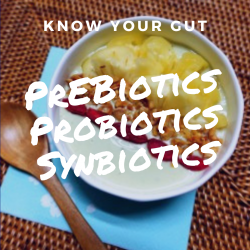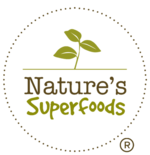-
No products in the cart.
Improving your gut health: Prebiotics, Probiotic, Synbiotics

Hippocrates once said, “all disease begins in the gut”.
It’s easy to overlook the health of our gastrointestinal system, even though it contains 10 times more health-determining bacteria than the rest of our body. There are over 100 trillion organisms in the gut, that make up ¾ of our immune system – protecting us from infection, supporting our metabolism, and promoting healthy digestion and elimination.
Dr Loh, a consultant from Singapore Medical Specialists Centre, highlighted that when our digestive tracts are affected (gut flora get disrupted) by poor eating habits or medication such as antibiotics, we may experience problems ranging from abdominal symptoms such as bloating, diarrhea and constipation to other conditions such as weight gain, diabetes mellitus and skin eczema.1 In addition, dysbiosis (an imbalanced gut microbiota) can lead to intestinal inflammation that could damage the gut lining. If untreated, it may lead to chronic digestive disorders such as Irritable bowel syndrome (IBS), leaky gut syndrome, celiac disease and colon or rectum cancer. 2
You’ve probably heard of the benefits of Prebiotics, Probiotics and Synbiotics as ‘Nutrition Boosters’ which help promote a healthy digestive and immune system. What are they?
Prebiotics
Prebiotics are specific types of fiber that support the growth of good bacteria in your gut.
Examples of prebiotics are inulin, fructo-oligosaccharides, and galacto-oligosaccharides.
Recommendations of prebiotic-rich foods:
Green vegetables like asparagus, broccoli, leeks, onion, garlic, brussels sprouts, lentils,
fruits like berries and avocado, bananas, grapefruit, and dried fruits, yacon root and oats. 3
Serving size: 4 small cups of prebiotic-rich foods a day.
Nature’s Superfoods Organic Yacon Slices and Organic Yacon Root Syrup are well known as prebiotic superfoods that are satisfyingly sweet due to its naturally-occurring fructo-oligosaccharides – FOS content (35-40%) , low in calories (because FOS is not able to be metabolized in the body) and very low in glycemic index (GI <1). Consume 10g of Yacon slices right out of the bag daily! A great travel snack (to avoid constipation). Mix 1 full teaspoon of Yacon Syrup in a glass of warm/cold water/beverage for a pleasant prebiotic drink that improves digestion and bowel movement.
Probiotics
Probiotics are the “good” bacteria or live cultures that keep your gut healthy. They benefit the body, specifically the digestive system, by helping digest food, destroying disease-causing microorganisms, and producing vitamins.
Most research of probiotics nowadays covers two main species: lactobacillus and bifidobacterium.
L. acidophilus , a probiotic strain found in dairy products, like kefir and yogurt, helps promote gut integrity and nutrient absorption, thereby assisting with overall digestion.
Bifidobacterium, produce lactic acid that help keep the pH of the intestines more acidic, and thus reducing the likelihood of other, more harmful bacteria colonizing in the intestines. In view of the benefits of probiotics, more people are taking probiotics as a health supplement. The quantity of bacteria is measured in colony-forming units CFUs and most clinical studies have proven the effectiveness of probiotics when dosed at >1 billion CFU.4
Recommendations of probiotic-rich foods:
Fermented dairy foods : yoghurt, kefir, cheeses, which contain live cultures (for example, bifidobacteria and lactobacilli).
Non-dairy foods : kombucha ( lightly sweetened tea that goes through the fermentation process, while a symbiotic colony of bacteria and yeast (SCOBY) floats on top), kimchi (traditional Korean fermented vegetable that is created by fermenting cruciferous vegetables with lactic acid bacteria), sauerkraut, miso, nato and tempeh (both made by fermenting soybeans) and cultured non-dairy yogurts. 1,3
Serving size : 1 cup of probiotic-rich foods a day
Synbiotics (Prebiotics +Probiotics)
Synbiotics refer to foods/supplements with synergistic benefits from both prebiotics (a “good” bacteria promoter) and probiotics (“good” bacteria). Synbiotic foods can be easily made by combining prebiotic-rich foods with probiotics to increase the servings of both in your diet, as suggested by Dr Axe.The idea behind synbiotics is that adding prebiotics to probiotics make the probiotics more effective.
Synbiotic Recipes
(a) Add yacon syrup (prebiotic-rich food) to kefir/yogurt (probiotic-rich foods) with toppings of your favourite fruits (bananas + berries).
(b) Stir-fry asparagus, garlic, onions and tempeh along with an assortment of other veggies. 5,6
In short, a diverse and balanced gut microbiota can be achieved by incorporating foods containing prebiotics and probiotics into the diet to create a healthier and more energetic you.
References
(1) Loh PY (Sept 2018). Good eating habits and the role of probiotics. Retrieved from: https://www.businesstimes.com.sg/life-culture/good-eating-habits-and-the-role-of-probiotics
(2) Eveline G (Apr 2019). Healthy gut, healthy body? The latest on supplements promoting digestive health. Retrieved from: https://www.todayonline.com/singapore/healthy-gut-healthy-body-latest-supplements-promoting-digestive-health
(3) Oz . Eat the Right Amount of Probiotics and Prebiotics. Retrieved from:
https://www.doctoroz.com/gallery/regimen-instructions?gallery=true&page=2
(4) Allison (Feb 2017) Probiotics Q & A: The Basics & Benefits Explained by a Dietitian.
(5) Axe (Feb 2019) What Are Synbiotics Supplements? Top 6 Synbiotics Benefits. Retrieved from:
(6) Anthea L (May 2018) Are Synbiotics the New Probiotics?

